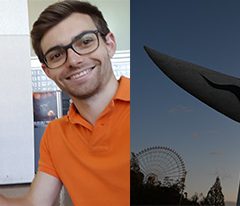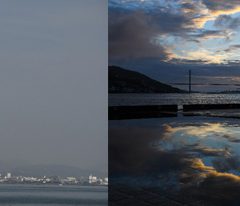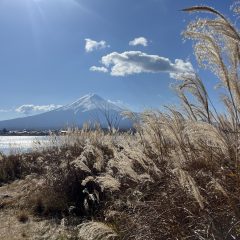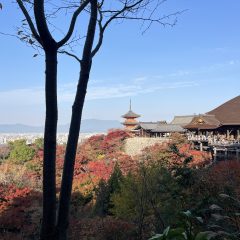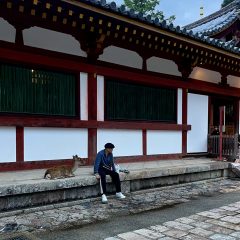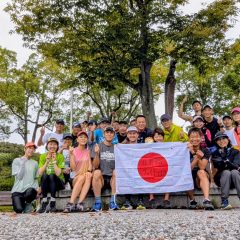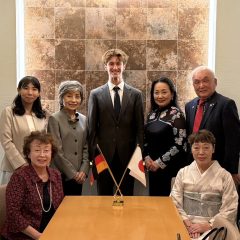☆☆☆Fifth Report of Christoph Jetter, 16th scholarship holder of Grünwald foundation☆☆☆

In order to experience the Japanese work culture as well as getting to know an international company I spent a few days at Yanmar, a global Engineering company from Osaka. During interesting introduction events of the company, visits at factories and exciting discussions about topics relevant for the future I was able to learn a lot about Japanese work life. I figured out that actions are more valuable than words when it comes to establish relationships with the fellow workers. Well established relationships are the foundation of business relationships as well as a functional working environment. This is also visible when looking at the Japanese tradition of gifting. In Germany we always relate Asia to long working hours. This is also true for Japan, since „9-5“ is more of an exception. However, Japanese workers do have more holidays then you might think. Especially bank holidays expand the holidays to a similar level like in Germany. However, Japanese people tend not to go on vacation for a longer period continuously. I did not understand that behaviour which is why I informed myself about it. I figured out that this behaviour is based on Japan being a culture characterised by collectivism rather than individualism like in Germany (Hofstede). Therefore, taking long holidays will increase the workload of the fellow workers which is considered as negative. I am pretty sure that this consideration
happens rarely in Germany.

Suita Rotact Club offers a special opportunity for me to meet people from Japan which are aged the same as me. Within the first 8 weeks in Japan I recognised that European people are still rare in Japan which is why especially older people react defensive and cautious to foreign people. However, Mr Okamoto is totally different which most likely is because of his long stay abroad. His foundation has a big impact on young Japanese people who get the opportunity to get in touch with foreigners and increase their knowledge about different cultures. Especially the people from Rotact asked me a lot of questions, were open minded and showed a lot of interest in exchanging thoughts. One reason why older generation might act differently could be due to Japan being an island and not getting in touch with different cultures on a regular basis. This is different to Germany where other countries are close by. Additionally, flights have been more expensive in the past, and traveling was not as convenient as it is nowadays. Anyway, the members of Rotact are shaped by a global mindset and grew up in a globalised world. Nevertheless, the influence of their parents can be seen since none of their members is able to speak English.

Within the Kansai area there is only one Christmas market, which seams to be obvious because of the religious background of japan. This Christmas market used to be a German Christmas market which is why I arranged to go there with my German and Japanese friends. Expensive mulled wine, sweets and German sausages shaped our pre-Christmas evening in Osaka. Even though Christmas is not part of Buddhism I was told that Christmas is increasing in importance, mainly shaped by the companies to generate more revenue. This is also visible when walking through Osaka where you can see a lot of Christmas lights, shopping malls which got decorated for Christmas, ice skating areas and Christmas music. Spending time with their families, nice food and contemplativeness are parts of the Japanese New Year’s Eve ceremony, rather than having fireworks like in Europe. However, the Christmas market had a lot of visitors. Nice to see is the incorporation of European and Japanese culture on events like this. While in Germany people tend to by themselves a meal, Japanese people split up and get different things and share everything in the end. This attitude I would like to implement within my daily life in Germany as well since it offers the opportunity to try more different things as well as it is a sign of collectivism.

Even before arriving in Japan I was interested in Japanese ceramic. I like the different understanding of aesthetics. While in Europe it is about perfectionism and clear lines, in Japan its about being perfect while being irregular. Additionally, the shapes and colours different to European standards which I find very interesting. In order to get a better understanding of the products I visited a local pottery together with two students of the Kyoto University. Besides getting information about the understanding of their craftsmanship we were able to try ourselves by preparing two items. Thereby, I got told about the importance of the seasons in the Japanese culture which also have a significant influence on the choice of crockery within daily life. While the Japanese culture is closely linked to their environment, I do not understand why Japan is still using so much plastic. Out of all countries I visited so far, Japan is the most environmentally unfriendly country when it comes to the use of plastic. In supermarkets everything is covered in plastic, mostly more than once and sometimes just for visual purposes. It could also be that strawberries are individually surrounded by plastic. From a developed country like Japan I expect more engagement in saving the environment even though some of the traditions, like gifting or extra enrichment might suffer.

Since the last four weeks have started it is already time to say goodbye to some people. Therefore, Family Ikawa organised another dinner with outstanding homemade food as well as traditional Sukiyaki, beer and sake. We had a lovely evening together and Mr and Ms Ikawa are great chefs. I am glad I could get some of the recipes. I liked Kobe very much from the beginning and I really appreciated the effort of Family Ikawa on giving me more insights about the surrounding highlights. I hope to return the favour next time they come to Germany.

Mr Okamoto, his wife, Ms Moriyama and I made a three-day trip to Toyama (To=many; Yama=mountains), the home of Ms Okamoto. This trip was the first time that I got out of the big cities and saw the rural part of Japan. I was impressed by the different sceneries Japan has to offer. High mountains, autumn leaves, sea and rivers which made their way through the landscape. The main difference to the crowded cities was the pace of living, the connectivity of the people to the environment and the public transport which was not present (even in cities with up to 600.000 people). The close relationship to the environment as well as the appreciation of the sea was also shown by the popular crabs (Kani) of this region. This delicacy is only available during a special season which is why a single crab could be worth up to 400.000 Yen (approximately 3000€). However, people spent the money in order to share this special meat with their family and friends. This behaviour of appreciation has a very high rank within the society and shows once more that Japan is a culture of collectivism rather than individualism. In Japan, I got another perspective to the German behaviour characterised by individualism and I want to critically evaluate my behaviour. During our three—day trip I was able to visit the traditional city Shirakawa, Kanazawa and its impressive castle, mountain peaks and a lot of
high-quality food.




